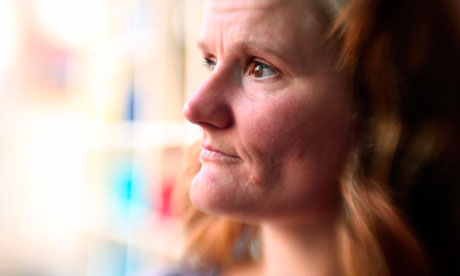
All I wanted was cheering up. But Monday-night TV didn't roll that way. Pain, war, alcoholism, attempted suicide, self-dismemberment, unfunny sitcoms, the sheer relentlessness of human futility. It only needed a documentary of George Osborne yucking it up on his skiing holiday with billionaire hedge fund managers to make the evening completely miserable.
In Stieg Larsson's Millennium trilogy there's a baddie who has congenital analgesia. Try as she might, Lisbeth Salander can't hurt him. In Horizon: The Secret World of Pain (BBC2), we met several people living similarly pain-free lives, but none as comfortably numb as Ronald Niedermann. Maya Linn recalled watching a marching band pass by from a window when she was a girl. Her mother, drawn by a smell, came into the room and peeled her daughter off the hot radiator on which she had been roasting.
Then there was the disarmingly upbeat Tuscan family who don't experience extremes of temperature. As they related one grisly story after another, I thought of the self-styled Tantric Iceman. Wim Hof, who recently did a half-marathon at the north pole wearing only shorts (way to impress the ladies, Wim), claims to control his body temperature – or at least his perception of it – through meditation. The pain-free Tuscans are different: a mutation in a single gene called SCN9A means they feel pain mutedly, if at all. Identifying that gene, apparently key for pain perception, gives geneticists hopes for doing something for those who suffer too little – or too much. Lisbeth Salander should have retrained as a geneticist.
Sue Learoyd's film for Horizon had enough material for a mega-ratings exploitation franchise. The Family That Doesn't Feel Pain. The Man Who Sawed Off His Own Arm. The Human Fireball Who Lost All His Skin. The film's greatest pleasure was that each painful story was narrated without exploitativeness aforethought, but with the aim of teaching us some science.
We learned that one in five Britons suffers chronic pain (a figure probably skewed by full-time TV reviewers). One suggestion was that premature babies in neo-natal units endure so many pain-related procedures during intensive care that the development of pain's neural pathways is altered. Among chronic sufferers was 16-year-old Rachel, who was born prematurely and, following an accident aged 12, now feels pain that shifts from head, to feet, to arms to legs without respite. "You just want to take the pain yourself," said her mum. The poor love: of course she does.
Marc Isaacs spent three months buttonholing smokers outside Highbury magistrates court, often interrupting them over their last fag before they went to meet their juridical fates. The monster. Outside the Court (BBC4) could have been exploitative, but was mostly tender, occasionally beautiful and had me crying for an hour.
"I am not normal and never will be," said Michel, the alcoholic Frenchman who had beaten an assault rap but not got the rehab referral he so clearly needed. And then he stopped the interview, because it deluded him into feeling important. "It's make me feel good to speak in front of the camera. But I am not important. I am a failure." Oh, to look at the world through those tired eyes, to realise that nobody can flee himself however much he wants to and then to hobble up Holloway Road, expecting nothing – at least nothing good. The last time we heard from Michel, the police had just stopped him hanging himself in his flat.
I needed Episodes (BBC2) to be funny, but episode four, possibly because of Mervyn King, was all laugh-free longeurs. Truly, this is the age of austerity.
US marines spent Christmas blowing up mosques and houses all along the most dangerous street in the world (aka Pharmacy Road in Sangin) to reach an abandoned British fort. On The Battle for Bomb Alley (BBC1), there was a suspenseful sequence in which a crocodile of marines unwittingly fairy-stepped with a daisy chain of IEDs inches below their feet. Reporter Ben Anderson asked, erm, didn't the British walk this selfsame walk a few years back?
The reportage was gripping, but highlighted the limitations of Panorama's reduced time slot. After 30 minutes from the frontline, we needed 20 minutes analysing this apparently Sisyphean exercise in futility. Instead we got a posturing marine captain telling the Taliban through the BBC's mediation: "You don't have enough bullets to stop us accomplishing this mission. This is America's longest war – so what?" But, whichever side you're on, that isn't enough.

